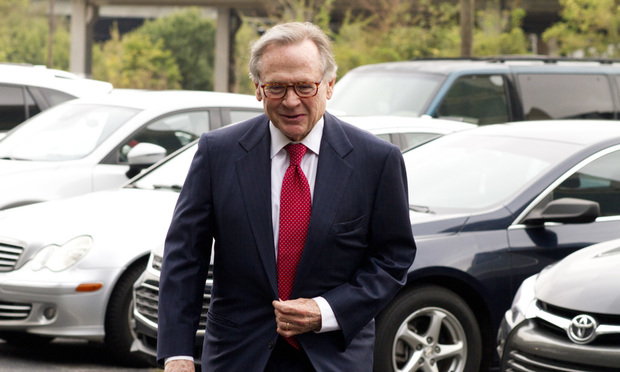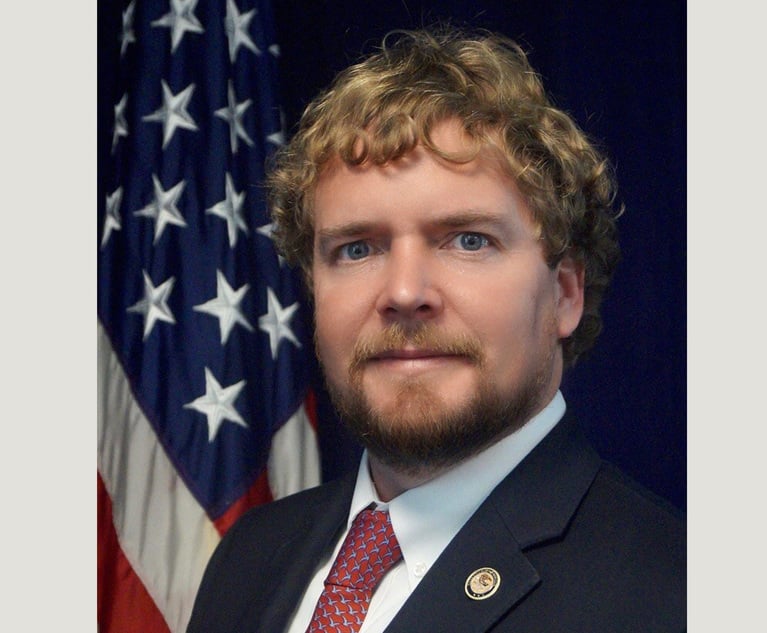Hotly Contested Expert in Embezzlement Trial Says Firm Still Owes Hardwick Money
Forensic accountant J.P. Gingras testifed for the defense that the $26 million Hardwick took from now-defunct Morris Hardwick Schneider was his fair share—and that there were no escrow shortfalls.
October 08, 2018 at 02:49 PM
7 minute read
 Ed Garland, Garland Samuel & Loeb, Atlanta. (Photo: John Disney/ ALM)
Ed Garland, Garland Samuel & Loeb, Atlanta. (Photo: John Disney/ ALM)
Forensic accountant J.P. Gingras took the stand Friday in the government's embezzlement trial against Atlanta lawyer Nathan Hardwick IV, despite vociferous behind-the-scenes objections from prosecutors on the case.
The government has alleged that Hardwick stole $26 million from his now-bankrupt law firm, Morris Hardwick Schneider, by directing MHS's former controller, Asha Maurya, to wire funds from its operating and escrow accounts directly to casinos, bookies and jet charter companies as well as to his personal holding company, Divot Holdings. Prosecutors presented thousands of pages of documentation to the jurors during their case, which they wrapped up on Oct. 2.
But during lengthy testimony, Gingras on Friday told the jury that, according to his calculations, the $26 million that Hardwick received from the residential real estate firm actually was all money due to him. He also testified that there were no escrow account shortfalls.
The defense team, led by Ed Garland of Garland, Samuel & Loeb, has maintained that Maurya, not Hardwick, is the only culprit for the escrow shortfalls. Maurya pleaded guilty to one count of wire fraud conspiracy last year and is cooperating with the prosecutors, but did not testify.
The defense has long wanted to call Gingras as an expert witness to critique the prosecutors' claim that Hardwick stole the $26 million. Lead prosecutor Doug Gilfillan had objected both before and during the trial that Gingras' methodology is “unreliable.”
Garland's Direct
Garland portrayed Gingras to the jury as an independent expert on Friday, the third day of the defense's case. “Are you here as an advocate for the defendant?” the lawyer asked.
“Not at all. I'm an independent forensic accountant,” Gingras replied.
Gingras told the jury his task was to determine if Hardwick received “too much” money from MHS—and if it came from escrow funds.
Instead of comparing the $26 million that Hardwick received with the firm's net income, which was just over $10 million for the period between 2011 and 2013, according to audited financial statements presented by the government, Gingras said it should be compared with the other owners' payouts.
The firm's “net income is irrelevant in terms of who got what—in terms of excess distribution,” Gingras told the jurors. He used “distribution” to mean any funds owners received from MHS other than salaries and bonuses—not profit distributions. As an S-Corp., MHS was a pass-through entity that disbursed profits directly to its equity partners.
“What is your expert opinion?” Garland asked.
“Mr. Hardwick was not overdisbursed,” Gingras replied, adding that the firm actually owed him $470,000.
He used a whiteboard to show the jury his calculations. MHS's other owners, brothers Mark and Gerard Wittstadt, “likely received” $15 million from 2011 through 2014, Gingras told them, and they together held a 45 percent interest in the firm.
That meant the total amount MHS should have distributed to equity partners was $33.3 million, he said. Thus, Hardwick, with a 55 percent interest, should have received $18.3 million.
Gingras added that the firm also owed Hardwick repayments for two loans of $6.45 million and $2.2 million, bringing the total due Hardwick to just over $26 million.
“Figures don't lie. Accounting terms don't lie. The calculations don't lie,” Gingras told the jurors.
Gingras determined there was no shortage in the escrow accounts, because MHS's 2014 tax return, filed in January 2016, reported a loss of only $4.7 million for the year—not a large enough hole to be escrow shortfalls.
“I see no evidence that anything close to $30 million is missing from the escrow accounts, as the government has asserted,” Gingras concluded.
Earlier, Erika Meinhardt, an executive with MHS's largest title-insurer, Fidelity National Finance, testified for the prosecution that Fidelity ultimately spent $29.5 million plugging the escrow shortfalls.
Of the numerous charts of calculations that Gingras showed the jury, one on the escrow accounts prompted a strenuous objection from Gilfillan. The judge sent the jury out of the courtroom and, during a heated discussion, the prosecutor asserted that Gingras had not disclosed he would be addressing the escrow shortfalls.
Gilfillan's Cross
“I'm an objective observer,” Gingras reiterated to Gilfillan on cross-examination, but he acknowledged that he had conferred with the defense team on trial breaks.
“OK, let's just go to your bottom line,” Gilfillan said. “Your expert opinion, for which you are being paid $65,000, is that the firm owed Mr. Hardwick money?”
“Yes, that's what the numbers show,” Gingras replied.
Gilfillan challenged Gingras' methodology, saying that, if Hardwick took $26 million from MHS in profit distribution, then the firm's net income for the period was $52 million.
“There is not a single document in evidence that Asha Maurya told Nat Hardwick that the firm made $52 million,” the prosecutor said.
Gingras said he was not talking about net income, and the firm could have distributed $52 million “in cash flow.”
But Hardwick only reported $1.4 million in income on his 2012 tax return, Gilfillan retorted, even though he actually took $7.5 million from the firm that year, according to the government's investigation.
“Distributions are not taxable, just net income from the firm,” Gingras replied.
Gilfillan again showed the jury texts from Hardwick to Gerard Wittstadt blaming Maurya for the escrow shortfalls: “She totally screwed me and told me we were making all this money and overdisbursed me. … I'm so upset.”
“So he claims he was overdisbursed—and now he's owed money?” Gilfillan asked Gingras.
“I'm relying on [MHS's] tax return,” Gingras said.
Gilfillan challenged Gingras' statement that MHS owes Hardwick $6.4 million, which Gingras again sourced to the firm's 2014 tax return. The prosecutor reminded the jury that Hardwick, in order to plug an initially estimated escrow shortfall of $6.4 million, borrowed $5 million from his client, pro-golfer Dustin Johnson, and local businessman Jim Pritchard, then contributed $1.4 million himself.
MHS has paid off the two loans, Gilfillan told the jury, adding that Hardwick used the firm to guarantee them. MHS and its insurer, Endurance Insurance Services, settled the unpaid loans and resultant civil suits with each creditor in March 2016, according to a May 2016 bankruptcy filing from the firm.
“The tax return says Mr. Hardwick has a loan due to him of $6.4 million. I'm relying on that,” Gingras reiterated.
The other loan for $2.2 million that Gingras claimed MHS owed Hardwick was actually made to Hardwick by a Fidelity subsidiary, Fortuna, Gilfillan said. The firm had been paying the loan for Hardwick, then deducting the payments from his profit distributions.
In concluding the contentious cross, Gilfillan also challenged Gingras' assertion that the $26 million that Hardwick received from MHS was commensurate with the Wittstadts's payouts.
“Nat Hardwick was sending emails directing Asha Maurya to send him big sums for years,” the prosecutor said. Gingras replied that the other equity partners also did.
Gilfillan asked if Gingras had seen any emails from the other partners to Maurya directing her to “send $500,000 to the Cosmopolitan for a friend's pool party.”
“Answer the question,” Gilfillan interjected as Gingras began an explanation. “You're an independent expert. It's a yes or no question.”
“Absolutely,” Gingras said, but the Wittstadts instead asked Maurya to send money to their personal accounts. “The difference here is Mr. Hardwick asks her to send it directly to the casino.”
READ MORE:
Witness in Hardwick Embezzlement Trial Describes Need to Fete Clients
Alleged Co-Conspirator a No-Show as Hardwick Prosecution Rests
Hardwick Spent Law Firm's Millions on Jets, Gambling, GIrlfriends, Jurors Hear
Ex-Partner Tells Jurors That Hardwick Kept Him in the Dark
Hardwick's Ex-Partner Recounts Big Debts, Expenses in Embezzlement Trial
'A Thief and a Liar': Jurors Hear Accusations, Accounting as Hardwick Trial Begins
This content has been archived. It is available through our partners, LexisNexis® and Bloomberg Law.
To view this content, please continue to their sites.
Not a Lexis Subscriber?
Subscribe Now
Not a Bloomberg Law Subscriber?
Subscribe Now
NOT FOR REPRINT
© 2025 ALM Global, LLC, All Rights Reserved. Request academic re-use from www.copyright.com. All other uses, submit a request to [email protected]. For more information visit Asset & Logo Licensing.
You Might Like
View All


Trending Stories
- 15th Circuit Considers Challenge to Louisiana's Ten Commandments Law
- 2Crocs Accused of Padding Revenue With Channel-Stuffing HEYDUDE Shoes
- 3E-discovery Practitioners Are Racing to Adapt to Social Media’s Evolving Landscape
- 4The Law Firm Disrupted: For Office Policies, Big Law Has Its Ear to the Market, Not to Trump
- 5FTC Finalizes Child Online Privacy Rule Updates, But Ferguson Eyes Further Changes
Who Got The Work
J. Brugh Lower of Gibbons has entered an appearance for industrial equipment supplier Devco Corporation in a pending trademark infringement lawsuit. The suit, accusing the defendant of selling knock-off Graco products, was filed Dec. 18 in New Jersey District Court by Rivkin Radler on behalf of Graco Inc. and Graco Minnesota. The case, assigned to U.S. District Judge Zahid N. Quraishi, is 3:24-cv-11294, Graco Inc. et al v. Devco Corporation.
Who Got The Work
Rebecca Maller-Stein and Kent A. Yalowitz of Arnold & Porter Kaye Scholer have entered their appearances for Hanaco Venture Capital and its executives, Lior Prosor and David Frankel, in a pending securities lawsuit. The action, filed on Dec. 24 in New York Southern District Court by Zell, Aron & Co. on behalf of Goldeneye Advisors, accuses the defendants of negligently and fraudulently managing the plaintiff's $1 million investment. The case, assigned to U.S. District Judge Vernon S. Broderick, is 1:24-cv-09918, Goldeneye Advisors, LLC v. Hanaco Venture Capital, Ltd. et al.
Who Got The Work
Attorneys from A&O Shearman has stepped in as defense counsel for Toronto-Dominion Bank and other defendants in a pending securities class action. The suit, filed Dec. 11 in New York Southern District Court by Bleichmar Fonti & Auld, accuses the defendants of concealing the bank's 'pervasive' deficiencies in regards to its compliance with the Bank Secrecy Act and the quality of its anti-money laundering controls. The case, assigned to U.S. District Judge Arun Subramanian, is 1:24-cv-09445, Gonzalez v. The Toronto-Dominion Bank et al.
Who Got The Work
Crown Castle International, a Pennsylvania company providing shared communications infrastructure, has turned to Luke D. Wolf of Gordon Rees Scully Mansukhani to fend off a pending breach-of-contract lawsuit. The court action, filed Nov. 25 in Michigan Eastern District Court by Hooper Hathaway PC on behalf of The Town Residences LLC, accuses Crown Castle of failing to transfer approximately $30,000 in utility payments from T-Mobile in breach of a roof-top lease and assignment agreement. The case, assigned to U.S. District Judge Susan K. Declercq, is 2:24-cv-13131, The Town Residences LLC v. T-Mobile US, Inc. et al.
Who Got The Work
Wilfred P. Coronato and Daniel M. Schwartz of McCarter & English have stepped in as defense counsel to Electrolux Home Products Inc. in a pending product liability lawsuit. The court action, filed Nov. 26 in New York Eastern District Court by Poulos Lopiccolo PC and Nagel Rice LLP on behalf of David Stern, alleges that the defendant's refrigerators’ drawers and shelving repeatedly break and fall apart within months after purchase. The case, assigned to U.S. District Judge Joan M. Azrack, is 2:24-cv-08204, Stern v. Electrolux Home Products, Inc.
Featured Firms
Law Offices of Gary Martin Hays & Associates, P.C.
(470) 294-1674
Law Offices of Mark E. Salomone
(857) 444-6468
Smith & Hassler
(713) 739-1250







